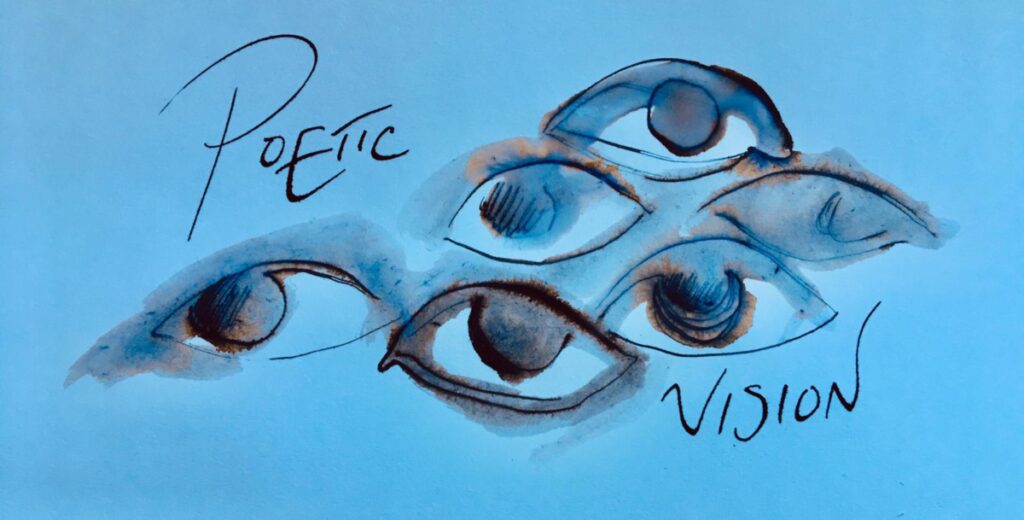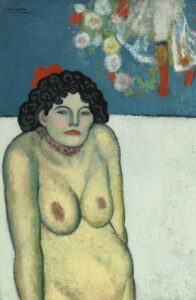Menu
Poetic Vision: Intermingled Visions (A Reading)
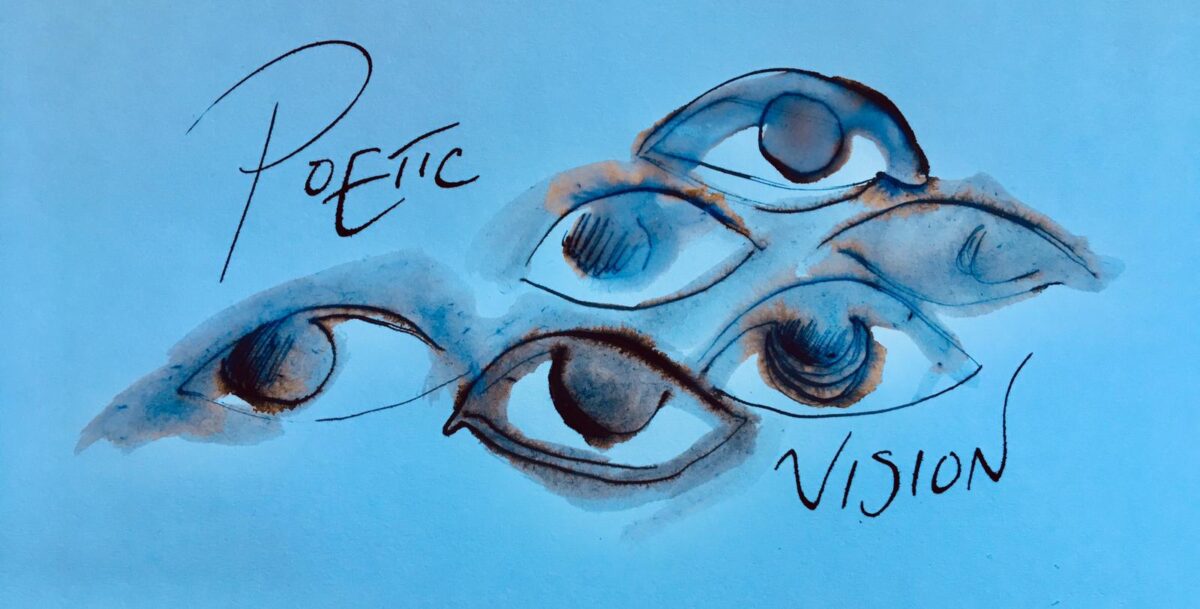
Our Poetic Vision virtual event series explored the intersections between poetry, visual art, film, and the sciences. In the opening webinar, available as a replay, four interdisciplinary poets shared insights from their practice and presented writing invitations. In this concluding Intermingled Visions reading on 23 May 2021, co-hosted by Singapore’s Sing Lit Station, 12 poets from around the world read poems written using these prompts, including both participants in the annual Singapore Poetry Writing Month (SingPoWriMo) and Crista Siglin’s Poetry As_A Lens workshop.
Artwork by Crista Siglin
Readers
Erika Kielsgard
teaches English literature and creative writing for The City University of New York (CUNY) and is an alumna of Brooklyn College’s MFA Program, where she serves as an editor-at-large of The Brooklyn Review. Her poems have found generous homes in Bone Bouquet, Cordella Magazine, The Penn Review, and others; most recently, you can find her fiction in Maudlin House and hear her read for The Brooklyn Rail’’s New Social Environment #226: Radical Poetry Reading.
Twitter @orchidnymph.
On Poetic Process
My ideas about engaging with art and science are symbiotic if not amalgamate, prioritizing care: first, to amend anthropocentric perceptions of "life" in the interest of liberating aesthetic and subjective finitude, and second, that this interest sustainably supports a diverse engagement with imagination, meaning, and expression in both human and non-human life-worlds. SAND's series inspired my process and helped to clarify these experiences and reflections of care on the page. (Thank you Crista, everyone in Session A [of the Poetry As_A Lens workshop], Kanika, Jess, Federico, and Janée!)
The Flower Mantises She Cares For
Hymenopus coronatus. Native to the forests of Southeast Asia, these flower mantises resemble Phalaenopsis orchids, adopting the colorations, shapes, and movements of these species. These appearances modify as the nymphs progress in their life cycle, mirroring the flora of their environment.
is a Cyprus-based poet and short story writer whose work has appeared in numerous journals and anthologies around the world. Her poetry was included in Being Human (Bloodaxe Books, 2011), Capitals (Bloomsbury, 2017), and, most recently, in the Live Canon Anthology 2020.
Web noranadjarian.com ❋ Twitter @NoraNadj
On Poetic Process
Ekphrasis in the Greek sense of the word is essential to the way I work as a poet. Description becomes expression and vice versa. I also love approaching a work of art at a random tangent to arrive at a really unexpected place.
Kate Segriff
is a Canadian writer, filmmaker, and visual artist. Her work has appeared in Prism International, Prairie Fire, and Storm Cellar magazines, among others. Her feminist short films have been selected for over 50 film festivals worldwide.
On Poetic Process
For me, the visual and written word are part of a continuum. I believe my writing is improved by envisioning, and sometimes literally sketching, the images in my head and transforming those tangible artscapes into words. Likewise, I am inspired by the art of others and when I am considering an art piece that touches me it is as if I can hear it speaking, telling me its story in words.
Ayilisha Manthira
is an arts organiser who was the executive producer and co-host of the Solliladanga podcast series on Singapore Tamil literature. She received the NAC Golden Point Award’s second prize for Tamil poetry in 2019. Her poem “Seithigalin Saaram” was featured in the Cordite Poetry Review’s 2020 Singapore poetry anthology.
On Poetic Process
I was inspired to write this poem after reading a New York Times article in 2019 documenting the instance of an artist in Hong Kong standing in the middle of a protest and painting everything he was witnessing on a canvas. The artist said that he was creating that piece of art because of being aware that the Chinese government was heavily censoring the media, and that his painting would be a way for him to record history and more likely escape the government’s hands to reach the next generations. My poem was an imagination of how the canvas would have witnessed the protests, what (coming from the protests) would have gotten mixed in the paint used and have become a part of the painting, and also “history”. Thus, it was not a piece of art that I was looking at, but rather the act of an artist painting on a canvas in the middle of ongoing protests that made me write the poem.
Perry Dino, 53, an artist who captures protests with oil on canvas, even through tear gas: "People can take thousands of photos at a protest, but I only create one painting. Photos can be deleted but to destroy my paintings, you will have to burn them." https://t.co/Hn29Fhas57 pic.twitter.com/qTlIFWEo1z
— The New York Times (@nytimes) July 28, 2019
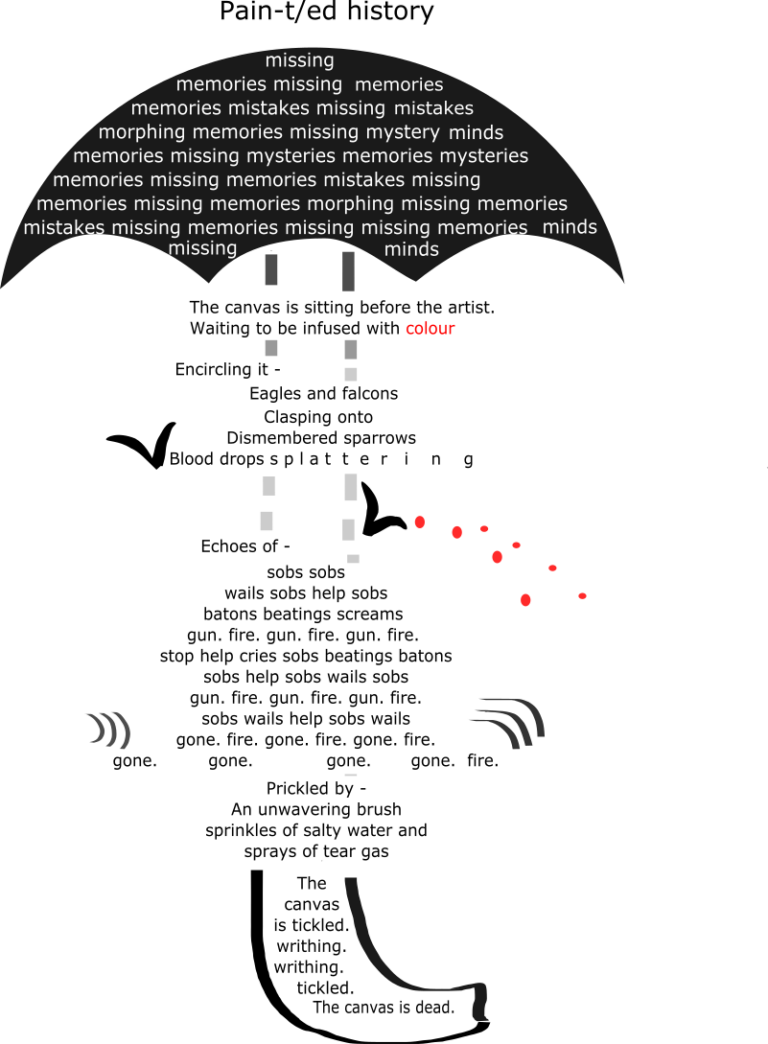
Lune Loh
is a trans lesbian writer. She is also a core member of /S@BER, a Singaporean writing collective, and is currently an undergraduate at the National University of Singapore.
On Poetic Process
Some of my own poetics are influenced via an attention to the formal structure of other artistic modes, whether it is music or visual art. I do not write so much about science as I do write in an interrogation of science, where it takes “Nature” as given and for granted. I will be reading an ekphrasis of Manet's "Olympia" (1856), which explores such themes.
Ang Shuang
Ang Shuang’s work has been published by the Asian-American Writers’ Workshop, The Rumpus, and Tinderbox Poetry Journal. She graduated with an MFA from Sarah Lawrence College and is now working on her debut collection and her rescue dog.
On Poetic Process
My poems are often mood-driven, which means I tend to get inspired by art, film, or music. For this particular piece, I was inspired by the artwork “Judith with the Head of Holofernes” by Lucas Cranach the Elder.
Gita Ralleigh
is a writer and medical doctor with work in Bellevue Literary Review, Wasafiri, and Magma Poetry. She teaches creative writing to medical students and has an MSc in the medical humanities. Her poetry collection A Terrible Thing is published by Bad Betty Press.
On Poetic Process
I find ekphrastic writing to be a wonderful entry point when teaching and was particularly interested in the idea that poetry inspired by film could be considered ekphrasis. Inspired by Janée [Baugher]'s prompt on gender in art/film, I tried to interrogate the 'girl warrior' trope in films such as the Hunger Games and how it extends to the portrayal of activists such as X Gonzalez.

Winifred Wong
is a Singaporean writer based in Berlin. Her work has been published in SOFTBLOW, Yahoo!, and Esplanade Theatres. Her EP things i’m afraid to tell you is available on all streaming platforms. Her debut short play Alexa will be screened at the Kreuzberger HofFestSpiele later this year.
On Poetic Process
I am inspired and intrigued by art hidden in plain sight, especially around Berlin where people are unapologetically themselves, and I love that I can filter it through the web of my subconscious and make it mine.
Links
Read two of her poems posted on SingPoWriMo Facebook page:
Read the poem “A Gift for You” by Eileen Myles, which informed “house/home.”
Artistic Influences for Reading
Dr. Patricia Falkenburg
is a molecular biologist, a poet writing in German and English, and a visual artist. Born in 1961 in Mannheim, she currently lives in Pulheim, near Cologne. Her poems have been published in numerous anthologies, journals, and blogs. Her collection Portugiesische Notizen (Portuguese Notes) was published in 2019 as LyrikHeft 24 by Sonnenberg-Presse, Chemnitz.
On Poetic Process
As it turns out, ekphrastic writing is one of my major poetic occupations. Being myself both a scientist and a poet/visual artist, I am very fascinated by the intersection of art and science and exploring their relation in the poetic process.
Supplementary Artwork
Patricia writes: “I accept the invitation and send two images in addition to the poems I am going to read. I perceive both as connected to the subjects explored in the texts. I realized hands on in correspondence to my poem ‘Watching Carole Feuermann sculpturing womb’ – quite a sarcastic comment maybe. The second poem I’d like to present, ‘Traditional dilemma,’ takes us to the zone where science and religion meet not all too happily. ‘Faith’ may give room to ponder on implications and is in itself an ekphrastic image referring to a musical event that took place in pre-covid times in my favourite Cologne museum (the Kolumba Museum).”
Ben Luton
is a student of CD Wright and an avant-garde radio artist from the Gulf Coast, with the notable distinction of Hurricane Katrina refugee. His poetry can be found in Lana Turner and his extraterrestrial dispatches on Radio Free Brooklyn.
On Poetic Process
I believe that anthropology and all its outgrowth classifications (e.g., psychology and sociology) are not only capable of defining culture itself but set a prerogative for cultural activity: social stewardship. Art, just like any other form of social organization, is an ongoing non-terminating activity; that is the nature of history, and neither art’s culpability nor its potential for transformation and liberation can be unwound from this activity. Using Federico’s bee dance prompt, I juxtapose a public/poem voice fragmented by brute sound with social media transcripts in an attempt to describe the permeability of identities through social organization.
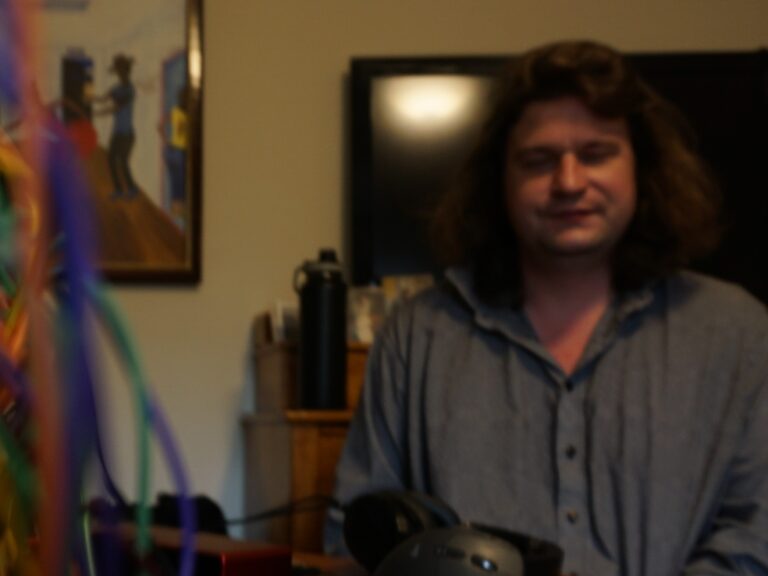
Link
- Recently published interview
- Ben’s radio show, “No Thing Considered”
Rea Maac
is originally from Marinduque, Philippines and has been working in Singapore since 2010. Her poem was shortlisted in Migrant Worker Poetry Competition Singapore 2017.
On Poetic Process
In writing my poems, I often wonder what's the real story behind an artwork and this leads me to dig deeper. Art allows me to process the feelings it evokes, in a way that captures my own experience.
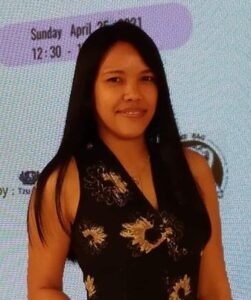
Miguel Barreto García
writes poetry and performs spoken word about family, boyhood, and history. They completed their PhD in decision neuroscience, and began performing in Switzerland’s poetry slam scene. Their poems have appeared or have been accepted in Rattle, Magma, wildness, harana, and The Quarterly Literary Review Singapore, among others.
On Poetic Process
Many of my poems are influenced by Mark Rothko, especially his Red on Maroon series. There are so many ways to engage with the painting, and I've written many poems about it.
Link
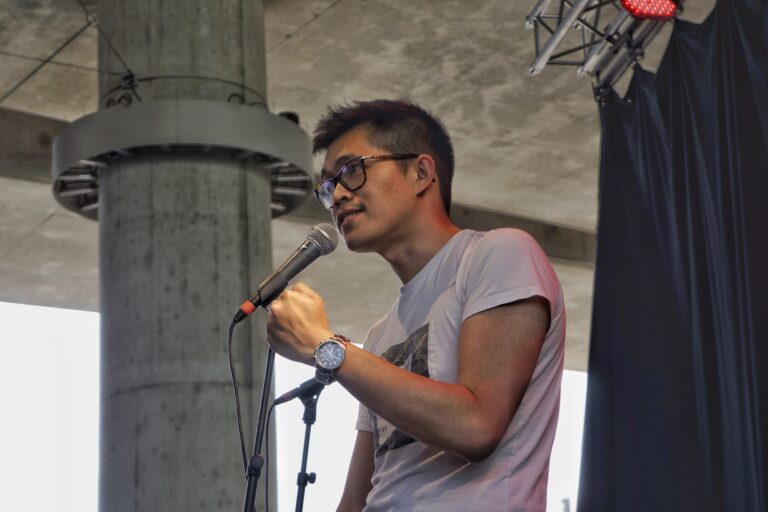
Co-Hosts
Reading Moderators
- Jake Schneider, Editor in Chief at SAND
- Charlene Shepherdson, Station Control of Sing Lit Station
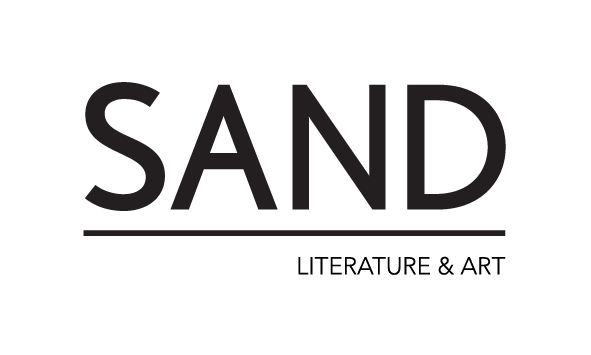
SAND
Based in Berlin, SAND is a nonprofit literary journal published twice a year by a team from the city’s international community. Featuring work by writers, translators, and artists from around the world, SAND seeks out fresh and underrepresented perspectives. Since our founding in 2009, our large, evolving team has published more than two thousand pages of visual art and English-language fiction, nonfiction, and poetry (including translations) from over fifty countries and territories.
Our current issue, SAND 22, is available here in both print and digital versions.
Learn more:
You can learn more about SAND on this website, follow us on Instagram (@sandjournalberlin), Twitter (@sandjournal), or Facebook (SAND Journal), or subscribe to our newsletter to hear about future events, news, and opportunities:
Voluntary donations:

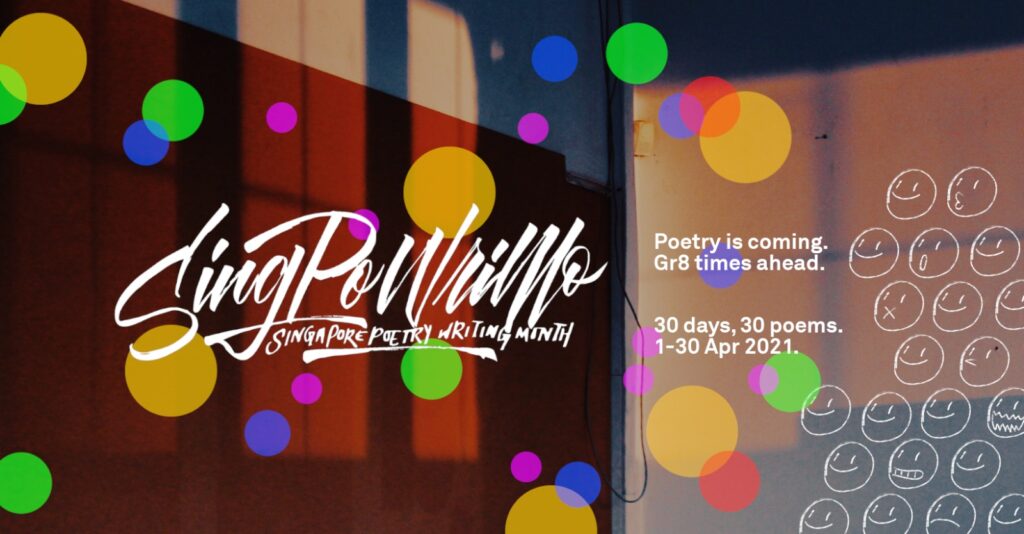
Sing Lit Station & SingPoWriMo
Members of the SingPoWriMo online community have written more than 20,000 poems in response to diverse prompts over the past eight Aprils. Sing Lit Station has also staged poetry readings on trains, buses and ferries; painted invisible poems on Singaporean sidewalks that appear in the rain; and organised the first Manuscript Bootcamp in Southeast Asia. It also administers the Hawker Prize for Southeast Asian Poetry and stages the only performance poetry / professional wrestling hybrid performance in the world, Sing Lit Body Slam. As a physical space, Sing Lit Station hosts a writing residency, masterclasses, and monthly peer-run writing groups consisting of practicing and aspiring writers, migrant workers, queer folk and more, and more facilitated communities such as Writing The City.
Learn more:
You can learn more about Sing Lit Station on their website. SingPoWriMo is organized as a Facebook group, which you can join here.

